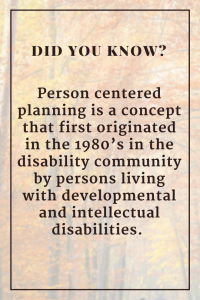You ask, our advocates answer. This month our peer advocate, Suzanne, discusses person centered planning.
Meet Julia, a peer advocacy client. She called us because she felt her case manager was not listening to her. Julia’s case manager had never asked her what her goals were for housing. Without asking, her case manager picked out an assisted living facility. Julia did not want to move there. Instead, she wanted her own apartment in a diverse community of people of all ages and abilities.
Julia’s peer advocate wrote a letter to her case manager mentioning her right to person centered planning, community integration, and transition services. The advocate also identified Julia’s reasonable housing goals. The advocate served as a conduit for Julia to be “heard” by her case manager. After the case manager received the advocate’s letter, she called Julia and actively listened to her. Finally, Julia felt listened to and respected. Soon, Julia will be in her own apartment near her grandchildren—integrated into the community.

What is person centered planning?
A recent development in case management services is the requirement that services be provided using person centered care planning. Person centered planning is strength based and focuses on individual capacities, preferences and goals. This means that rather than being told what to strive for and how this should be accomplished, the person receiving services works together with their provider to identify reasonable goals and to decide how these goals can be achieved.
How do I go about identifying my goals?
When thinking about your goals it is important to consider not only what you ideally want but to also think about what is realistic. List the goals you would like to see happen in your life. For example, these goals might include: a) part time employment, b) living in your own apartment, c) having more friends, or d) reconnecting with family.
Can I get everything I ask for?
Keep in mind, you may not get everything you ask for. Your request must be reasonable, and will at times depend on ability of the community to meet your needs/request (i.e. whether the type of housing you request is available in the community you wish to live in). If your case manager thinks a goal is not reasonable, ask them to explain why and what you can do to change the situation. What is impossible today may be a possibility in the future.
How do I approach my case manager about person centered planning?
Before you meet with your case manager, think about how you want to prepare for the meeting and create a list to follow so that you don’t forget anything. To begin the conversation let them know that you have heard about person centered planning and would like to review the goals currently identified in your plan of service and possibly change some of them. Let them know that you have given a lot of thought about your life goals and what quality of life means to you. If you have talked with mental health professionals, friends, or family to gain feedback and support, which is highly recommended, pass that information on as well.
By: Suzanne Bachman, Peer Advocate